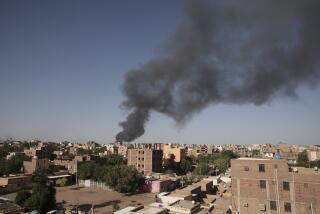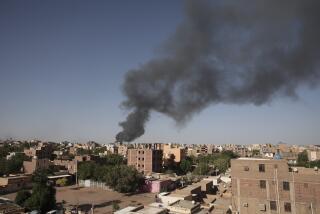More Americans Flee From War-Torn Liberia : West Africa: Sierra Leone urges its neighbor’s president to resign to help end the conflict.
- Share via
ABIDJAN, Ivory Coast — More frightened Americans fled war-torn Liberia on Sunday, some leaving behind all they own.
More than 260 people took seats on two U.S.-chartered flights from Monrovia to Abidjan in Ivory Coast. They were to fly to Charleston, S.C., today on a U.S. military transport plane.
Some 360 U.S. citizens and close Liberian relatives left the West African country last Sunday in a similar operation.
“We left everything,” said American engineer Charles Narayan as he sat with his Indian wife, Madhu, in a barn-like reception center set up by the U.S. Embassy in Abidjan.
“It was time to go. Everybody in our building had left. I was just hoping something would come out of the peace talks, but now there’s a stalemate.”
Talks in Sierra Leone between President Samuel K. Doe and representatives of rebel leader Charles Taylor broke up without a result Saturday, with promises to meet again next Monday.
The rebels have fought to within 30 miles of Monrovia since invading from Ivory Coast six months ago. The rebellion has turned into a vicious tribal feud and many fear a massacre if the rebels take the capital by force.
Sierra Leone’s ruling party on Sunday suggested that the Liberian president quit and leave his country to end the civil war.
The United States, in the past a supporter of Doe’s rule, has also urged him to step down and leave the country.
In an editorial published Sunday, We Yone, the newspaper of Sierra Leone’s All People’s Congress, said, “How much is Doe prepared to give?
“When all is said and done, the solution rests with one man, and the challenge is that of statesmanship,” it said.
Narayan, the American engineer, said embassy officials had been pressing the Americans to leave Liberia. They finally decided to go after a friend was murdered outside the capital, one of hundreds of civilian victims of the conflict.
“(Government) soldiers have started getting into people’s homes and robbing them,” said Narayan, on his way to Los Angeles. He said there is a severe food shortage, with basic goods changing hands at vastly inflated prices.
Many of those leaving Monrovia were U.S.-born Liberians who left relatives inside the country, founded in 1847 by freed American slaves, and at least half the evacuees were children.
Toddlers clutching U.S. passports waited patiently to have their papers checked before filing through to the huge reception room, a warehouse outfitted with fans, sofas and mattresses.
U.S. officials said it was not clear if there would be any more evacuation flights out of Monrovia.
Some Liberian citizens were allowed to accompany children holding U.S. passports. Nathaniel Nagbe said he was taking his son to rejoin his American mother in Gaithersburg, Md.
“I am in constant fear,” he said. “People do not know when and how the rebels will attack the city, and there are constant rumors of government soldiers harassing and killing.”
He said he did not expect to stay more than three months in the United States. “At this age--I’m 46--I don’t intend to live in any foreign country that long.”
More to Read
Sign up for Essential California
The most important California stories and recommendations in your inbox every morning.
You may occasionally receive promotional content from the Los Angeles Times.










